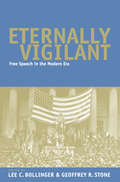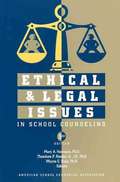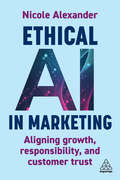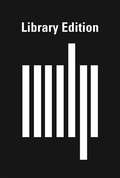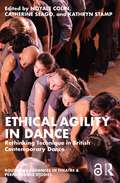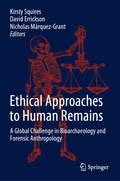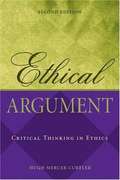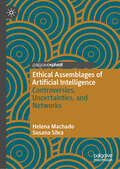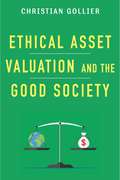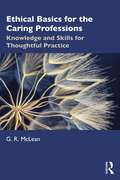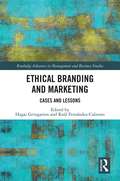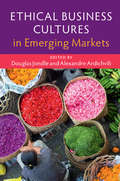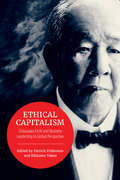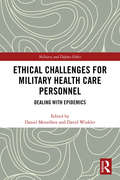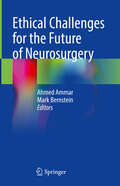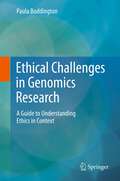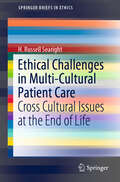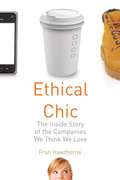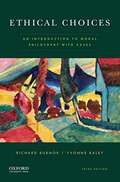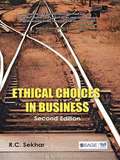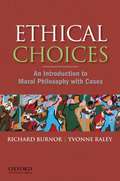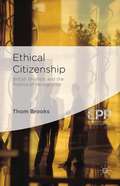- Table View
- List View
Eternal Sunshine of the Spotless Mind (Philosophers on Film)
by Christopher GrauEternal Sunshine of the Spotless Mind is one of the most widely discussed and thought-provoking films of recent years. This is the first book to explore and address the philosophical aspects of Eternal Sunshine of the Spotless Mind. Beginning with a helpful introduction that places each essay in context, specially commissioned chapters examine the following topics: philosophical issues surrounding love, friendship, affirmation and repetition the role of memory (and the emotions) in personal identity and decision-making the morality of imagination and ethical importance of memory philosophical questions about self-knowledge and knowing the minds of others the aesthetics of the film considered in relation to Gondry’s other works and issues in the philosophy of perception Including a foreword by Michel Gondry and a list of further reading, this volume is essential reading for students interested in philosophy and film studies.
Eternally Vigilant: Free Speech in the Modern Era (Social History Of Modern Art Ser.)
by Geoffrey R. Stone Lee C. BollingerWhile freedom of speech has been guaranteed us for centuries, the First Amendment as we know it today is largely a creation of the past eighty years. Eternally Vigilant brings together a group of distinguished legal scholars to reflect boldly on its past, its present shape, and what forms our understanding of it might take in the future. The result is a unique volume spanning the entire spectrum of First Amendment issues, from its philosophical underpinnings to specific issues like campaign regulation, obscenity, and the new media. "With group efforts, such as this collection of essays, it is almost inevitable that there will be a couple—and often several—duds among the bunch, or at least a dismaying repetition of ideas. Such is not the case here. . . . Whether one agrees with a given author or not (and it is possible to do both with any of the essays), each has something to add. Overall, Eternally Vigilant is a thoughtful and thought-provoking book, consistently intelligent and, at times, brilliant."—Richard J. Mollot, New York Law Journal Contributors: Lillian R. BeVier Vincent Blasi Lee C. Bollinger Stanley Fish Owen M. Fiss R. Kent Greenawalt Richard A. Posner Robert C. Post Frederick Schauer Geoffrey R. Stone David A. Strauss Cass R. Sunstein
Ethical & Legal Issues in School Counseling
by Ph. D. Theodore Phant Remley Mary A. Hermann Wayne C. HueySchool counselors face ethical and legal challenges every day. Whether you are new to the field or have been practicing for years, "Legal & Ethical Issues in School Counseling" provides valuable information and guidelines to help you meet these challenges head-on. Edited and compiled by three experts in the field, this book is a compilation of some of the most informative journal articles previously published. Chapters cover confidentiality, danger to self and others, reporting abuse and neglect, mental disorders and referral, and supervision of school counselors.
Ethical AI in Marketing: Aligning Growth, Responsibility and Customer Trust
by Nicole AlexanderThe rapid evolution of AI presents marketers with unparalleled opportunities, but innovation inevitably invites scrutiny. To stay ahead, marketers must ensure their use of AI is both effective and ethical.Whether you're launching your first AI marketing initiative or scaling existing programs, this practical guide equips senior marketing professionals and aspiring leaders with the strategic insight and tactical expertise needed to navigate the complexities of AI-driven marketing. Offering a comprehensive roadmap for those responsible for implementing AI solutions, it explores how to harness AI's transformative power while upholding ethical standards and fostering consumer trust.Through real-world examples from organizations such as Ally, OSF Healthcare, Adobe, and Ipsos, the book examines how businesses are addressing key challenges, from navigating privacy considerations while delivering personalized experiences to developing governance frameworks that ensure ethical oversight without hindering innovation. It delves into the strategies that create sustainable competitive advantages through ethical AI adoption and provides a nuanced understanding of how companies at various stages of AI maturity are approaching responsible implementation. By illuminating both the challenges and opportunities that arise in AI adoption, this book offers marketers the tools and frameworks necessary to build trust, drive innovation, and ensure AI-driven marketing aligns with long-term ethical and business goals.
Ethical Adaptation to Climate Change
by Allen Thompson Jeremy Bendik-KeymerPredictions about global climate change have produced both stark scenarios of environmental catastrophe and purportedly pragmatic ideas about adaptation. This book takes a different perspective, exploring the idea that the challenge of adapting to global climate change is fundamentally an ethical one, that it is not simply a matter of adapting our infrastructures and economies to mitigate damage but rather of adapting ourselves to realities of a new global climate. The challenge is to restore our conception of humanity--to understand human flourishing in new ways--in an age in which humanity shapes the basic conditions of the global environment. In the face of what we have unintentionally done to Earth's ecology, who shall we become? The contributors examine ways that new realities will require us to revisit and adjust the practice of ecological restoration; the place of ecology in our conception of justice; the form and substance of traditional virtues and vices; and the organizations, scale, and underlying metaphors of important institutions. Topics discussed include historical fidelity in ecological restoration; the application of capability theory to ecology; the questionable ethics of geoengineering; and the cognitive transformation required if we are to "think like a planet. "
Ethical Adaptation to Climate Change: Human Virtues of the Future
by Allen Thompson Jeremy Bendik-KeymerAn analytically precise and theoretically probing exploration of the challenge to our values and virtues posed by climate change.Predictions about global climate change have produced both stark scenarios of environmental catastrophe and purportedly pragmatic ideas about adaptation. This book takes a different perspective, exploring the idea that the challenge of adapting to global climate change is fundamentally an ethical one, that it is not simply a matter of adapting our infrastructures and economies to mitigate damage but rather of adapting ourselves to realities of a new global climate. The challenge is to restore our conception of humanity—to understand human flourishing in new ways—in an age in which humanity shapes the basic conditions of the global environment. In the face of what we have unintentionally done to Earth's ecology, who shall we become?The contributors examine ways that new realities will require us to revisit and adjust the practice of ecological restoration; the place of ecology in our conception of justice; the form and substance of traditional virtues and vices; and the organizations, scale, and underlying metaphors of important institutions. Topics discussed include historical fidelity in ecological restoration; the application of capability theory to ecology; the questionable ethics of geoengineering; and the cognitive transformation required if we are to “think like a planet.”
Ethical Agility in Dance: Rethinking Technique in British Contemporary Dance (Routledge Advances in Theatre & Performance Studies)
by Noyale Colin Catherine Seago Kathryn StampThis edited collection examines the potential of dance training for developing socially engaged individuals capable of forging ethical human relations for an ever-changing world and in turn frames dance as a fundamental part of human experience. This volume draws together a range of critical voices to reflect the inclusive potential of dance. The contributions offer perspectives on contemporary dance training in Britain from dance educators, scholars, practitioners and artists. Through examining the politics, values and ethics of learning dance today, this book argues for the need of a re-assessment of the evolving practices in dance training and techniques. Key questions address how the concept of ‘technique’ and associated systems of training in dance could be redefined to enable the collaboration of skills and application of ideas necessary to twenty-first-century dance. The editors present these ideas in different modes of writing. This collection of essays, conversations and manifestos offers a way to explore, debate and grasp the shifting values of contemporary dance. Examining these values in the applied field of dance reveals a complex and contrasting range of ideas, encompassing broad themes including the relationships between individuality and collectivity, rigour and creativity, and virtuosity and inclusivity. This volume points to ethical techniques as providing a way of navigating these contrasting values in dance. It serves as an invaluable resource for academics as well as practitioners and students.
Ethical Approaches to Human Remains: A Global Challenge in Bioarchaeology and Forensic Anthropology
by Nicholas Márquez-Grant Kirsty Squires David ErricksonThis book is the first of its kind, combining international perspectives on the current ethical considerations and challenges facing bioarchaeologists in the recovery, analysis, curation, and display of human remains. It explores how museum curators, commercial practitioners, forensic anthropologists, and bioarchaeologists deal with ethical issues pertaining to human remains in traditional and digital settings around the world. The book not only raises key ethical questions concerning the study, display, and curation of skeletal remains that bioarchaeologists must face and overcome in different countries, but also explores how this global community can work together to increase awareness of similar and, indeed, disparate ethical considerations around the world and how they can be addressed in working practices. The key aspects addressed include ethics in bioarchaeology and forensic anthropology, the excavation, curation, and display of human remains, repatriation, and new imaging techniques. As such, the book offers an ideal guide for students and practitioners in the fields of bioarchaeology, osteoarchaeology, forensic anthropology, medical anthropology, archaeology, anatomy, museum and archive studies, and philosophy, detailing how some ethical dilemmas have been addressed and which future dilemmas need to be considered.
Ethical Argument: Critical Thinking in Ethics
by Hugh Mercer CurtlerThis short introduction to ethics bridges the gap between theory and practice. By combining case studies with discussion of theoretical issues, the text introduces students to the most important ethical concepts. The book is an ideal introductory volume for undergraduate students.
Ethical Assemblages of Artificial Intelligence: Controversies, Uncertainties, and Networks
by Helena Machado Susana SilvaThis book critically examines the ethical challenges of Artificial Intelligence (AI), focusing on facial recognition and AI-assisted reproductive technologies. It explores how these issues intertwine with social and political processes and power dynamics in digital societies. What defines ethical versus unethical in the realm of AI? Why do some ethical debates dominate, while others are overlooked? Which actors and institutions align or diverge in these discussions? To address these questions, the authors introduce the concept of "ethical assemblages," offering fresh perspectives on the complexities of AI ethics and their impact on socio-technoscientific structures.
Ethical Asset Valuation and the Good Society (Kenneth J. Arrow Lecture Series)
by Christian GollierFor all of their focus on asset prices, financial economists rarely ask if assets are priced ethically—that is, if their prices are compatible with the public good. Yet in a world facing major, possibly catastrophic problems—global warming, for instance, and growing inequality—it is now more important than ever that we allocate capital to projects that will benefit society as a whole, not just today but far into the future. In this book, Christian Gollier develops a powerful method for transforming our societal goals of collective prosperity into the cornerstone of our financial decision making.Ethical Asset Valuation and the Good Society starts by stating transparent moral principles and, from these, derives simple rules that can be used to evaluate saving and investment decisions in terms of the public good. Rather than trying to explain observed asset prices, Gollier derives what these prices ought to be in order to direct capital toward socially desirable investments. He focuses especially on the two prices that drive most financial decisions—the price of time as reflected in the interest rate and the price of risk—and explores the role these play in our long-term planning. If investment projects in renewable energy could be financed at a lower interest rate than those linked to fossil fuels, for instance, the energy transition would be easier to accomplish. Building on criticism of the short-term thinking of financial markets, Gollier suggests ways to shift investment toward the future through the discounting of the valuation of assets and investments with long-term benefits. In this sophisticated but accessible work, Gollier builds a bridge between welfare economics and finance theory to provide a framework for ethical valuation capable of establishing what asset prices should be on the basis of our shared moral values.
Ethical Basics for the Caring Professions: Knowledge and Skills for Thoughtful Practice
by G. R. McLeanThis book trains students of the caring professions, across health and social care, in the basic philosophical skills and knowledge needed to deal with the ethical aspects of their profession. It shows why ethical education is required, and teaches the skills of reasoning that equip professionals to think critically about the theories and arguments used in ethical discussions. It demonstrates how we can be confident that we can rely on common moral ground; but it also points out how we need to recognise the influence of different world-views, and to note how, on some issues, these can lead us in starkly different directions. It explains relevant philosophical theories, and evaluates their strengths and weaknesses – particularly in relation to what is required for proper professional ethics. It shows how to employ the commonly accepted framework of four ethical principles – beneficence, non-maleficence, autonomy, and justice. These various matters are then illustrated in two extended case studies, which focus on the problem of euthanasia, and the question of screening for disability and the value of human life. Ethical Basics for the Caring Professions is designed for use on all health and social care and human services courses on ethics and values. It will also be of interest to academics and professionals working within these fields.
Ethical Branding and Marketing: Cases and Lessons (Routledge Advances in Management and Business Studies)
by Hagai Gringarten Raúl Fernández-CalienesEthical Branding and Marketing: Cases and Lessons provides current perspectives on fascinating global cases focusing on the specific combination of the two fields of "ethics" and "branding," on their relationship, and on how that joint perspective shapes brands, companies, business strategies, and the market itself. In a contemporary environment of "truthiness" and fake news, it is more important than ever to review core principles of ethics and to reassess how these principles apply to today’s branding and marketing practices. This book addresses practices in ethical branding and corporate culture. It includes such topics as truth, integrity, value, vulnerability, and differentiation. Collectively, these cases provide a contemporary overview of intriguing scenarios and best practices in ethical branding. The book provides the reader with real, updated insight into ethical decision making; helps students integrate ethics, branding strategy, and real life, complex situations into an effective learning process; and provides the reader with up-to-date ethical branding cases from around the world.
Ethical Business Cultures in Emerging Markets
by Alexandre Ardichvili Jondle DouglasPrevious research on corporate cultures and ethical business cultures has focused almost exclusively on studies of multinational corporations from a handful of developed countries. This book addresses the intersection of human resource development and human resource management with ethical business cultures in the four BRIC countries, and four other fast-growing emerging economies: those of Mexico, Indonesia, South Africa and Turkey. Drawing on longitudinal large-scale survey-based studies, it compares managers' and employees' perceptions of ethical business cultures in these countries, contrasting them with the US economy. It then discusses the economic and socio-cultural context and current research on business ethics in each of these countries, including implications for research and practice. This significant study will appeal to scholars, researchers and students in business ethics, management, human resource management and development, and organization studies, and addresses issues faced daily by business executives and practitioners working in emerging market countries.
Ethical Capitalism: Shibusawa Eiichi and Business Leadership in Global Perspective
by Kikkawa Takeo Patrick FridensonShibusawa Eiichi (1840–1931) was a Japanese banker and industrialist who spearheaded the modernization of Japanese industry and finance during the Meji Restoration. He founded the first modern bank in Japan and his reforms introduced double entry accounting and joint-stock corporations to the Japanese economy. Today, he is known as the “father of Japanese capitalism.” Ethical Capitalism is a volume of essays that tackles the thought, work, and legacy of Shibusawa Eiichi and offers international comparisons with the Japanese experience. Eiichi advocated for gapponshugi, a principle that emphasized developing the right business, with the right people, in service to the public good. The contributors build a historical perspective on morality and ethics in the business world that, unlike corporate social responsibility, concentrates on the morality inside firms, industries, and private-public partnerships. Ethical Capitalism is not only a timely work; it is a necessary work, in a rapidly globalizing world where deregulation and lack of oversight risk repeating the financial, environmental, and social catastrophes of the past.
Ethical Challenges for Healthcare Practices at the End of Life: Interdisciplinary Perspectives (Philosophy and Medicine #141)
by Sabine Salloch Anna-Henrikje SeidleinThis book presents a collection of exclusively selected manuscripts on current ethical controversies related to professional practices from an interprofessional perspective. Insights are provided into the diversity of practices and viewpoints from different countries are merged in a unique way. The book contributes to the debate on social and legal issues regarding end-of-life practices such as organ donation, medically assisted dying and advance care planning. In addition, joint international author groups contributed exclusive chapters about European comparisons on end-of-life topics. The focus on country- and culture-specific aspects broadens the view on key issues and makes the book attractive for an international readership. The variety of approaches and methods used informs and inspires the development of new research and best-practice projects.
Ethical Challenges for Military Health Care Personnel: Dealing with Epidemics (Military and Defence Ethics)
by Daniel Messelken David WinklerThis book examines the issue of ethics in the context of the provision of military health care in an epidemic. Outbreaks of epidemics like Ebola trigger difficult ethical challenges for civilian and military health care personnel. This book offers theoretical reflections combined with reports from recent military and NGO missions in the field. The authors of this volume focus on military medical ethics adding a distinct voice to the topic of epidemics and infectious diseases. While military health care personnel are always crucially involved during disaster relief operations and large-scale public health emergencies, most of the current literature treats ethical issues during epidemics from a more general perspective without taking into account the specifics of the military context. The contributions in this volume provide first-hand insights into some of the ethical issues encountered by military health care personnel in missions during the Ebola outbreak in 2014/2015. This practical perspective is complimented by academic analyses and theoretical reflections on ethical issues associated with epidemics. This book will be of much interest to students of military studies, ethics and African politics.
Ethical Challenges for the Future of Neurosurgery
by Ahmed Ammar Mark BernsteinThis work informs about major changes in health care systems at present and to come, and the ethical consequences. Rapid technological developments, especially in the fields of communication and virtual communication, artificial intelligence, implanted brain chips, augmented reality, in situ real-time pathological diagnosis of lesions during surgery, and others are challenging aspects of neurosciences in particular and medicine in general. Most of these modern technologies are available nowadays, just waiting to be tried and used. Ethicists (and neurosurgeons!) are facing unprecedented challenges as they have to be one step ahead in reading the future and predict what is coming and how the implementation of these technologies may affect patients’ safety, dignity, and autonomy. This book supports neurosurgeons and medical care providers to understand and implement the newly developed technologies, which will help advance medical care. Each chapter has been written by a world leader. Some of these authors are making the future and producing new advanced technologies. The authors discuss all the new innovations and the editors asked the authors to point out the ethical dilemmas if such technologies are implemented. The ethical questions are highlighted and suggestions are provided for solving such ethical problems to guarantee patient safety and dignity. According to the definition and principles of the Values-Based Medicine concept, the patient is the center of care, is the sole center of care. No compromising of patients’ well-being and safety can be allowed!
Ethical Challenges in Genomics Research
by Paula BoddingtonNew developments in science and technology have resulted in shifting ethical challenges in many areas including in genomics research. This book enables those who are involved in genomics research, whether as researcher, participant or policy maker, to understand the ethical issues currently developing in this field and to participate actively in these important debates. A clear account is given of how science and technology are outstripping the capacity of previous ethical regulations to cope with current issues, together with practical illustrations of possible ways forward. Key ethical ideas are presented, drawing on the history of research regulation and on an account of the particular challenges arising in the field of genomics. The book uses a grounded, practical approach to explaining ethical concepts and issues which is geared to enhancing interdisciplinary dialogue. Its broad approach to ethical issues includes relevant considerations from social psychology and there is a particular emphasis on understanding the problems of ethical regulations and practice in the institutional and social context of research. A glossary and numerous text boxes explaining relevant terms and key ideas help to make the work an invaluable resource for both beginners and experts in the field.
Ethical Challenges in Multi-Cultural Patient Care: Cross Cultural Issues at the End of Life (SpringerBriefs in Ethics)
by H. Russell SearightThis book provides an up-to-date description of cross-cultural aspects of end-of-life decision-making. The work places this discussion in the context of developments in the United States such as the emphasis on patient informed consent, “right to die” legal cases, and the federal Patient Self-Determination Act. With the globalization of health care and increased immigration from developing to developed countries, health care professionals are experiencing unique challenges in communicating with seriously ill patients and their families about treatment options as well as counselling all patients about advance medical care planning. While many Western countries emphasize individual autonomy and patient-centered decision-making, cultures with a greater collectivist orientation have, historically, often protected patients from negative health information and emphasized family-centered decision-making. In order to place these issues in context, the history of informed consent in medicine is reviewed. Additionally, cross-cultural issues in health care decision-making are analysed from the perspective of multiple philosophical theories including deontology, utilitarianism, virtues, principlism, and communitarian ethics. This book is a valuable addition to courses on end-of-life care, death and dying, cross-cultural health, medical anthropology, and medical ethics and an indispensable guide for healthcare workers dealing with patients coming from various cultural backgrounds.
Ethical Chic
by Fran HawthorneConsumers are told that when they put on an American Apparel t-shirt, leggings, jeans, gold bra, or other item, they lookhot. Not only do they look good, but they can also feel good because they are helping US workers earn a decent wage (never mind that some of those female workers have accused their boss of sexual harassment). And when shoppers put on a pair of Timberlands, they feel fashionable and as green as the pine forest they might trek through-that is, until they’re reminded that this green company is in the business of killing cows. But surely even the pickiest, most organic, most politically correct buyers can feel virtuous about purchasing a tube of Tom’s toothpaste, right? After all, with its natural ingredients that have never been tested on animals, this company has a forty-year history of being run by a nice couple from Maine . . . well, ahem, until it was recently bought out by Colgate. It’s difficult to define what makes a company hip and also ethical, but some companies seem to have hit that magic bull’s-eye. In this age of consumer activism, pinpoint marketing, and immediate information, consumers demand everything from the coffee, computer, or toothpaste they buy. They want an affordable, reliable product manufactured by a company that doesn’t pollute, saves energy, treats its workers well, and doesn't hurt animals-oh, and that makes them feel cool when they use it. Companies would love to have that kind of reputation, and a handful seem to have achieved it. But do they deserve their haloes? Can a company make a profit doing so? And how can consumers avoid being tricked by phony marketing? InEthical Chic,award-winning author Fran Hawthorne uses her business-investigative skills to analyze six favorites: Apple, Starbucks, Trader Joe’s, American Apparel, Timberland, and Tom’s of Maine. She attends a Macworld conference and walks on the factory floors of American Apparel. She visits the wooded headquarters of Timberland, speaks to consumers who drive thirty miles to get their pretzels and plantains from Trader Joe’s, and confronts the founders of Tom’s of Maine. More than a how-to guide for daily dilemmas and ethical business practices,Ethical Chicis a blinders-off and nuanced look at the mixed bag of values on sale at companies that project a seemingly progressive image.
Ethical Choices
by Richard BurnorIdeal for students with little or no background in philosophy, Ethical Choices: An Introduction to Moral Philosophy with Cases provides a concise, balanced, and highly accessible introduction to ethics. Featuring an especially lucid and engaging writing style, the text surveys a wide range of ethical theories and perspectives including consequentialist ethics, deontological ethics, natural and virtue ethics, the ethics of care, and ethics and religion. Each chapter of Ethical Choices also includes compelling case studies that are carefully matched with the theoretical material. Many of these cases address issues that students can relate directly to their own lives: the drinking age, student credit card debt, zero tolerance policies, grade inflation, and video games. Other cases discuss current topics like living wills, obesity, human trafficking, torture "lite," universal health care, and just-war theory. The cases provide students with practice in addressing real-life moral choices, as well as opportunities to evaluate the usefulness and applicability of each ethical theory. Every case study concludes with a set of Thought Questions to guide students as they reflect upon the issues raised by that case.
Ethical Choices in Business
by S C SekharPraise for the First Edition: '... a unique and lively business ethics text... fresh and delightful... Sekhar's witty use of stories and cases will engage and enlighten business people in India and the rest of the world' - Joanne B Ciulla, The Journal of Business Ethics 'Richly international in scope and contributes to global concern' - Newsltter IIAS Leiden University 'This book makes an important contribution through its holisitc and balanced approach to the issue... Each chapter has a fair number of relevant cases - many of which are good living examples one can learn from' - Business Standard Ethical Choices in Business is a highly successful text on the principles and practice of business ethics. The second edition of the universally acclaimed book explores the various facets of business ethics that involve the individual, the organisation and the society. With a wide socio-economic canvas, the book delves into: - Evolution of ethical values, - Integrating personal and other ethics, - Law and ethics, - Ethics and corporate governance, - Ethics and human resource management, - Problems in whistle-blowing, - Consequences of corruption, - Environmental ethics, - Ethics and gender balance, and much more. Written in an engaging manner, with cases, exercises, questionnaires, quotes and stories, this book is a very accessible resource for professionals and scholars who want to understand and emphasise ethical choices in their personal, professional and social domains.
Ethical Choices: An Introduction To Moral Philosophy With Cases
by Richard Burnor Yvonne RaleyIdeal for students with little or no background in philosophy, Ethical Choices: An Introduction to Moral Philosophy with Cases provides a concise, balanced, and highly accessible introduction to ethics. Featuring an especially lucid and engaging writing style, the text surveys a wide range of ethical theories and perspectives including consequentialist ethics, deontological ethics, natural and virtue ethics, the ethics of care, and ethics and religion. Each chapter of Ethical Choices also includes compelling case studies that are carefully matched with the theoretical material. Many of these cases address issues that students can relate directly to their own lives: the drinking age, student credit card debt, zero tolerance policies, grade inflation, and video games. Other cases discuss current topics like living wills, obesity, human trafficking, torture "lite," universal health care, and just-war theory. The cases provide students with practice in addressing real-life moral choices, as well as opportunities to evaluate the usefulness and applicability of each ethical theory. Every case study concludes with a set of Thought Questions to guide students as they reflect upon the issues raised by that case. Ethical Choices is enhanced by several pedagogical features. These include summaries at the end of each section, lists of key terms, questions For Reflection and Discussion at the end of each chapter,Guidelines for a Case Study Analysis,and suggestions For Further Reading that include Internet sources. Starred sections indicate more advanced material that may be included at the instructor's discretion.
Ethical Citizenship
by Thom BrooksCitizenship has come under increasing strain in the face of globalization. Our world gets ever smaller while it sometimes seems our borders are becoming ever more closed. What is citizenship and how can it be ethical? Should citizens owe each other special duties denied to non-citizens? How might theories about citizenship impact on our practices? Ethical Citizenship rediscovers a significant and distinctive contribution to how we might understand citizenship today in the first full length examination of this topic. Ethical citizenship is a communitarian relationship between members of a community based around a shared conception of the common good first defended by British Idealists. This book explores its historical roots, contemporary relevance and application to international politics in an engaging work by leading international scholars bringing together theory and practice.

